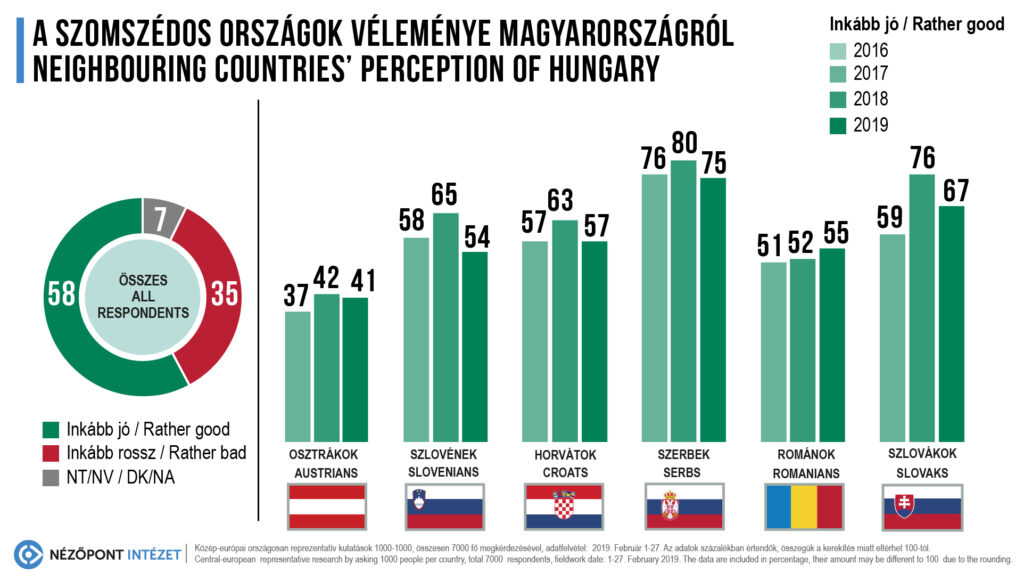European People’s Party top candidate Manfred Weber wants to protect Europe against nationalism, but he has failed to say who the nationalists were.
It is therefore important to realise that there is a great friendship among nations of the Carpathian Basin, according to the Charta XXI Reconciliation Movement commissioned Nézőpont Intézet public opinion poll conducted in several Central European countries. Polling in the spring of 2019 shows that Hungarians are held in high regard by most neighbouring countries, and only relationships with Romania – due to historical conflicts – and Ukraine – burdened by the recently introduced minority language law – have not yet changed positively on the Hungarian side. It is also a good sign that 6 out of 10 residents of the Carpathian Basin have a good opinion of Hungary.
Hungarians’ Perception of Neighbouring Countries
Since the second Orban government took office in 2010, Hungary’s neighbourhood policy has taken a major turn. The Cabinet has been working towards relations based on mutual respect and acknowledging sovereignty with all neighbouring countries. As a result, we have so far seen a strengthening of the Visegrad Cooperation, a reconciliation with Serbia, and the development of a pragmatic friendship with Romania.
It is historically fortunate that most neighbouring countries seek good relations with Hungarians. This effort has produced a high level of confidence among people in the Carpathian Basin. Strong nation-states have better cooperation and maintain peaceful relations.
The greatest proportion of Hungarians thought positively about Austria (73 percent), with 7 out of 10 people expressing a good opinion of the north-western neighbour. 70 percent has a good opinion of Croatia and 57 percent of Slovakia, but Slovenia was also mentioned rather positively (55 percent). The smallest proportion of Hungarians have a negative opinion of Croatia (4 percent), Slovenia (7 percent) and Austria (9 percent).
Croatia’s positive perception has changed the most since 2016 – the proportion of Hungarians who have a good opinion of their southern neighbours has increased by 11 percent (59 to 70). Perception of Slovakia shows similarly positive changes – in 2016 and 2019 positive opinions were expressed of the northern neighbour by 50 and 57 percent of Hungarian respondents, respectively.
On the other hand, favourable opinion on Austria has stabilized at a high rate – in 2019, the proportion of those who have a good opinion of Austria is two percent higher (73 percent) than it was in 2016 (71 percent). Although only within the margin of error, but the perception of Slovenia has become more positive as well – instead of the former 52, this time 55 percent of Hungarians professed to have a good opinion about it.
Only the traditionally conflicted relationship with Romania and recent hostility with Ukraine have not yet changed over into positive among Hungarians. In the case of Romania, one-third of Hungarians (33 percent) hold a good opinion of it, while Ukraine was received the most unfavourably among respondents (53 percent negative, and only 18 percent positive), with the country’s controversial new minority language law likely to be the main culprit. Volodymyr Zelensky’s attitude, however, may help bring change to Ukrainian-Hungarian relations.
Neighbouring Countries’ Perception of Hungary
Nézőpont Intézet did not only poll Hungarians about their views on neighbouring countries, but also looked at how neighbouring countries in the Carpathian Basin thought of Hungary. (with the exception of Ukraine, where the validity of public opinion polls is questionable due to war conditions). These results confirm that Hungary has a good image in the Carpathian Basin, with almost twice as many (58 percent) respondents expressing a positive opinion (58 percent) as the opposite (35 percent).
Based on the available data it can be said that among the peoples of Hungary’s neighboring countries, Serbians have the best opinion of Hungary (75 percent). The southern neighbours are followed by the Slovaks (67 percent), while between the Croats (57 percent), Romanians (55 percent) and Slovenians (54 percent) the result is a tie.
A point of consideration is that while Hungarians have a rather good opinion of Austria, the percentage of people who like Hungary is the lowest among Austrians.
Representative surveys of 1,000 people conducted annually in countries sharing a border with Hungary reveal that three-quarters of the Serbs have a good opinion of Hungary, while those that do not, constitute 23 percent only. The southern neighbour’s perception of Hungary has been quite positive in the past – a good opinion was expressed by 76 percent of respondents in 2017, and 80 percent in 2018.
Analysis of the results from different years shows a higher standard deviation for the Slovaks than the Serbs, but overall, two-thirds of the northern neighbours seem to think positively of Hungary. This spring, 67 percent said they had a good opinion of Hungary, and 27 percent responded differently.
57 percent of Croatian respondents expressed a positive opinion of Hungary, and only half as many (31 percent) said they did not like it. In other words, most Croatians relate to Hungary amicably.
Those who like Hungary constitute a clear majority also in Slovenia at 54 percent, which is a slight decline compared to last year’s result. It is, however, hardly surprising, considering the current press campaign against Hungary and the Hungarian Prime Minister.
In Romania, the proportion of those with good or bad opinions about Hungary has been mostly stagnant. The good news, however, is that the absolute majority have a good opinion, with 55 percent of the Romanian people expressing a positive and 39 percent a negative opinion of Hungary this year.
This shows that Romanians have a better opinion about Hungary than Hungarians do of Romania. Considering the rumors about Hungary’s alleged irredentism, the amicable Romanian attitude is particularly remarkable.
Interestingly, Hungarians have a good opinion of Austria, but the feeling is not mutual. Among neighbouring countries only in Austria there is no positive majority opinion of Hungary.
Manfred Weber’s anti-nationalism seems to be exaggerated when viewed from Central Europe. In the Carpathian Basin, national identity and strengthening of the and nation-states have brought about an increase in peace and trust among nations rather than evoked the spirit of hostility.
Methodology
The latest phone poll on the subject was conducted by Nézőpont Intézet between 1-27 February, 2019 involving 1,000 respondents in each country and 7,000 in total. (Data was collected between 4-15 February in Austria, 1-20 February in Croatia, 6-12 February in Hungary, 4-25 February in Romania, 2-16 February in Serbia, 1-20 February in Slovakia, 1-26 February in Slovenia) The sample is representative of populations 18 years old and over by gender, age, region, settlement type and education level. In case of a sample of 1,000 respondents the maxiumum margin of error is 3.1 percent. All data is in percentages. Totals may vary from 100 due to rounding.


